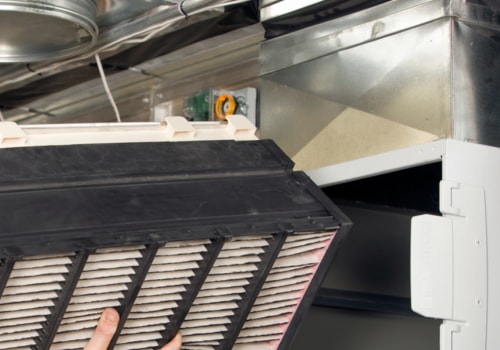How to Determine the Best AC Filter Size with David Heacock
Recognizing AC filter sizes plays a vital role in maximizing HVAC system efficiency and improving indoor air quality.
Using the correct size prevents air leaks, allowing dust and allergens to be effectively trapped. If filters are too small or too large, this can lead to system damage and higher energy bills.
Always check the owner's manual for the right dimensions, and pay attention to the MERV rating, which affects how well particles are filtered.
Regular maintenance of filters helps avoid clogs that can harm air quality and system performance.
There's a lot more to learn about different filter types and their effects on home environments.
Key Takeaways
• Proper AC filter size ensures effective allergen capture, enhancing indoor air quality and reducing respiratory problems.
• Filters that don't match in size can create air leaks, lowering HVAC efficiency and possibly harming the system.
• Regular filter upkeep prevents clogging, maintains airflow, and improves energy efficiency, resulting in lower utility costs.
• Selecting the right MERV rating is vital for efficient filtration without hindering airflow, optimizing system performance.
• Consulting the owner's manual for filter dimensions helps avoid issues and guarantees compatibility with HVAC systems.
Learning About Filter Sizes
Choosing an AC filter requires knowledge of how size affects performance. Filter dimensions significantly impact the effectiveness of an air conditioning system. A filter that's undersized fails to capture sufficient dust and allergens, while an oversized option may create fitting issues, causing compatibility concerns.
Before making a purchase, measure the current filter or refer to the unit's specifications to select the correct size. Manufacturers typically offer guidelines; adhering to these can prevent future complications. A filter that doesn't match can lead to air leaks, which decreases efficiency and could harm the system over time.
Depth also matters; filters vary in thickness, and using an incorrect one can disrupt airflow. Always check the owner's manual for recommended filter dimensions to sidestep potential problems.
Impact on Air Quality
Air quality heavily depends on the efficiency of an AC filter. A properly sized and maintained filter traps indoor allergens. Accumulation of particles can result in respiratory problems and allergic reactions. Checking and replacing filters as recommended by manufacturers prevents these issues.
Consider the filter's MERV rating as well, which shows its capacity to capture small particles. Filters with higher ratings enhance air quality by removing more allergens.
Proactive filter maintenance combined with proper sizing creates a healthier indoor environment for families. Taking the advice from David Heacock helps ensure clean and safe air to breathe.
Energy Efficiency Considerations
Checking and changing filters as needed keeps HVAC systems running smoothly. This simple task improves air quality and reduces energy costs. A well-maintained filter saves money by preventing unnecessary strain on the system.
Energy-efficient filters trap more particles and require less frequent changes while maximizing airflow. Investing in the right size and type of filter is essential. Choosing cheaper options may result in increased energy costs due to inefficiency.
Prioritize filter maintenance to boost system performance and save money—your wallet will appreciate it!
Performance of HVAC Systems
Efficiency in HVAC systems directly affects overall performance and comfort at home. One vital aspect of this efficiency involves filter maintenance. Regularly changing or cleaning filters allows your system to operate smoothly, enhancing optimal airflow dynamics.
Dirty or clogged filters restrict air movement, causing HVAC systems to work harder. Increased energy consumption follows, along with potential premature wear on equipment.
Restricted airflow prevents proper circulation of hot or cold air, resulting in uneven temperatures throughout homes. Certain rooms may feel warmer or cooler than others, leading to frustration.
Choosing the Right Filter Size
Selecting the right filter size for an HVAC system requires precision. Ensuring filter dimensions align with system specifications is necessary. A filter that's undersized may allow dust and allergens to escape, while an oversized option mightn't fit correctly, causing air leaks.
Start by checking the current filter size, which is usually printed on the frame. Assessing different filter types is essential, as these can affect air quality and system efficiency. Common options include HEPA, pleated, and fiberglass filters, each providing varying filtration levels.
Consider specific needs, such as allergies or pet dander, when choosing a filter. Some filters offer higher Minimum Efficiency Reporting Values (MERV), indicating improved filtering capabilities.
Selecting an appropriate MERV rating for the system is vital to prevent airflow issues.
Frequently Asked Questions
How often should I replace my filter?
Replace your AC filter every one to three months based on usage. Following filter maintenance tips help maintain optimal air quality. Regular replacement keeps the system running efficiently while extending its lifespan.
Can I use a different filter size temporarily?
Using a different size filter temporarily is possible, but compatibility must be ensured. A filter that does not match may not fit correctly, which could impact airflow and efficiency. Prioritizing the correct size is essential for long-term performance and maintaining air quality.
What happens if I use the wrong size of filter?
Using an incorrect filter size can greatly affect performance. Airflow problems may arise, resulting in lower efficiency and possible harm to the AC system. Always confirm the right filter size for peak operation.
Are all AC filters washable or reusable?
Not every AC filter is washable or reusable. To improve air quality and maintain filters effectively, check the filter type. Some filters are meant for disposal, while others can be cleaned and reused, which helps boost system efficiency.
How do I measure my AC filter accurately?
Measuring an AC filter size accurately involves specific techniques. Start by checking length, width, and thickness. Refer to established filter size standards, noting any framing or mounting variations to ensure a perfect fit.
Learn more about HVAC Care from one of our HVAC solutions branches…
Filterbuy HVAC Solutions - West Palm Beach FL
1655 Palm Beach Lakes Blvd., Ste 1005 West Palm Beach, FL 33401
(561) 448-3760






